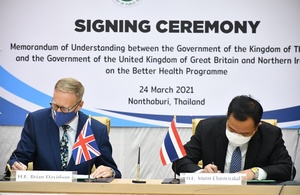- Actions to improve health outcomes for babies and children in England
- Personal child health records – known as the ‘red book’ – will be digitised by April 2023
- Review informs the government’s wider commitment to levelling up across the country
The early years review – ‘The best start for life: a vision for the 1,001 critical days’ – has been led by Early Years Health Adviser Andrea Leadsom MP and sets out a vision for best practice across the health system to ensure babies and children can get the best possible start.
Leading child health experts agree the care given during the 1,001 critical days has more influence on a child’s future than at any other time in their life, and experiences during this time have a significant impact on the health, wellbeing and opportunity of children throughout life.
However, children living in households in the lowest socio-economic groups have significantly worse health outcomes than other children. These can be caused by stress and smoking in pregnancy, as well as communication problems due to language inequalities.
In order to make sure families have all the information they need and to access their children’s data and easily share it with appropriate professionals, the government, working with NHSX and in consultation with parents, will bring forward work to digitise the personal child health record, commonly known as the ‘red book’. The red book contains babies’ details and information about their growth and development. Digitising it will ensure information is easier to store, protect it from being lost and make it easier to share with medical staff. This will apply to every new birth from April 2023, bringing it forward a year.
Health and Social Care Secretary Matt Hancock said:
I believe in the value that every single person has to offer, and I want every child to reach their full potential.
Everybody should have a solid foundation on which to build their health and we are determined to level up the opportunities for children, no matter their background or where they grow up.
I want to thank Andrea Leadsom for this inspirational and important report. Through her ‘action areas’, we will reduce the barriers and improve early childhood experiences – and we’re already making a start by bringing forward our commitment to digitise the red book by April 2023.
As part of the government’s determination to level up across the country, it’s crucial to ensure the youngest members of society – and the families who nurture and care for them – are given the help and support they need to ensure they can fulfil their potential in future.
To achieve this, the review highlights 6 action areas which are key to improving health outcomes in babies and young children:
- seamless support for families: local authorities will be encouraged to publish a clear Start for Life offer for parents in their area – a single publication making parents and carers aware of what support they can expect in their local area, including services they should expect to receive like health visits, and localised and specialist services, such as help to quit smoking and intensive parenting support
- a welcoming hub for families: this builds on the government’s commitment to champion family hubs, making them a place for families to access Start for Life services, such as childcare, early education and healthcare, as well as advice on jobs and training
- the information families need when they need it: designing digital, virtual and telephone services around the needs of the family, including digitising the personal child health record, commonly known as the ‘red book’
- an empowered Start for Life workforce: developing a modern skilled workforce to meet the changing needs of families with babies, looking at new ways to support and empower staff to increase retention of health visitors
- continually improving the Start for Life offer: health services for families and babies must improve data, evaluation and outcomes to ensure they are meeting a family’s needs. Work will continue across the system to hold local services to account, including through proportionate inspections, giving parents and carers confidence and assurance that services are working in their area
- leadership for change: work will begin to encourage local areas to nominate a leader and to ensure the delivery of the review is overseen at a national level
Health Minister Jo Churchill said:
We know the 1,001 critical days are crucial for development and impact a child’s health for the rest of their life.
Most babies are born healthy and enjoy a safe and nurturing childhood. However, some do not. Therefore, I am committed to removing barriers so all children are supported and nurtured so they are ready for life.
This vision document sets out key areas for improvement to ensure every child has an opportunity to thrive and achieve their potential, regardless of their background.
To implement this work, the Department for Health and Social Care will work with Public Health England, NHS England and Improvement as well as local government to map out the Start for Life journey of parents and carers that captures how they experience digital, virtual and telephone-based services during the 1,001 critical days from conception to the age of 2. We will ensure parents and carers have an NHS-branded ‘one stop shop’ online to access all the information they need.
The Chair of the Early Years Healthy Development Review, Rt Hon Andrea Leadsom MP, said:
Ensuring that every baby gets the best start for life has been my passion for more than 20 years, and I was delighted when the Prime Minister asked me to chair the Early Years Healthy Development Review last year.
When we started work on the review, I was clear that the needs of the baby must be at the heart of everything we do. The coronavirus pandemic has put even more pressure on already-struggling families and, just as we need to level up economic opportunity across the country, we need to level up the support and care for the very youngest.
The 6 action areas will have a transformational impact on our society, and I am looking forward to the implementation phase of the review where we will continue to work closely with families and the early years sector. I am confident that delivering this vision will help millions of families to give their baby the very best start for life.
This vision sets out an ambitious programme of work to transform the support for families. Work to implement it will begin in the coming months. The goal is to ensure the best support throughout those 1,001 critical days, setting babies up to maximise their potential for lifelong emotional and physical wellbeing.

